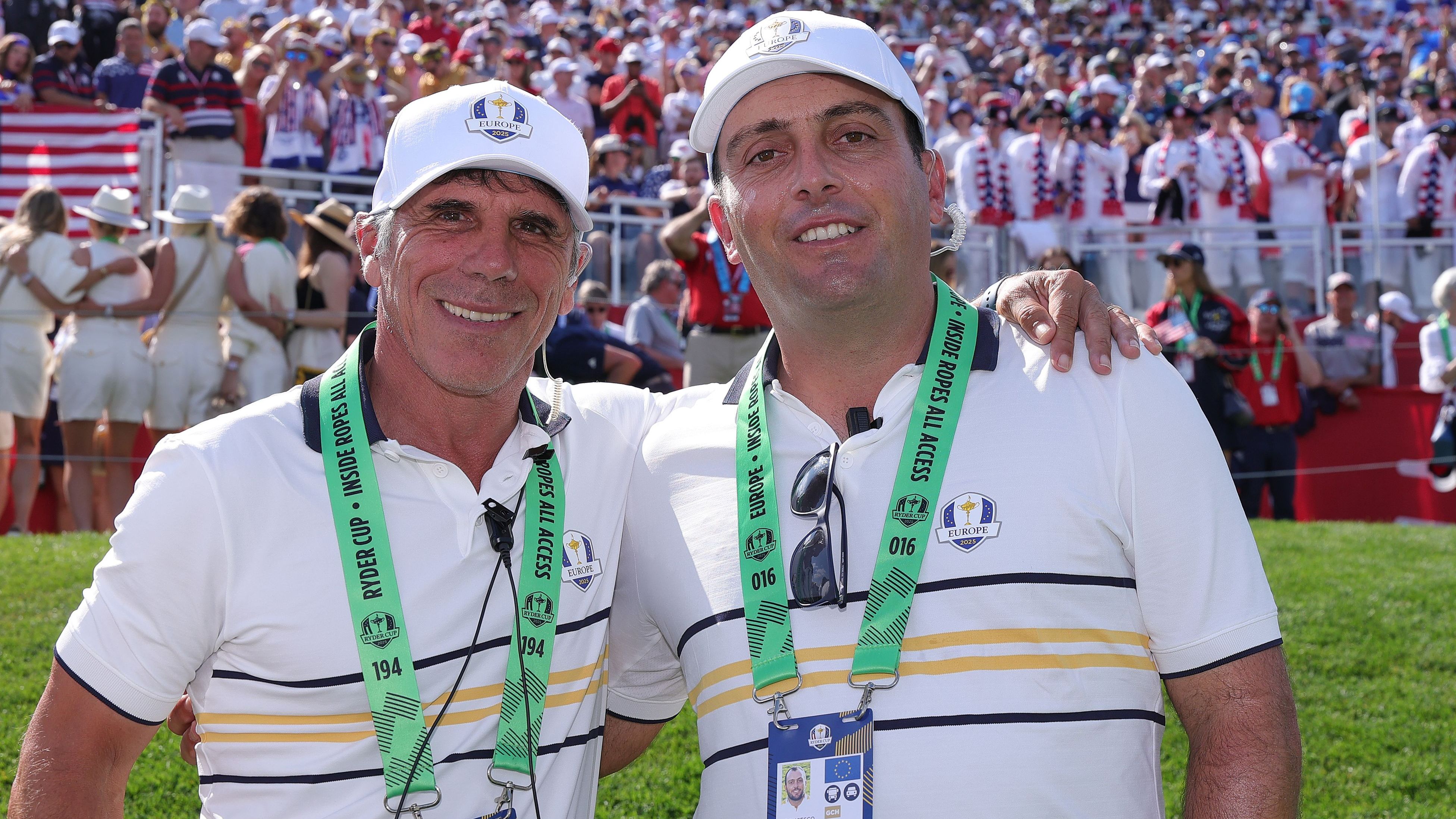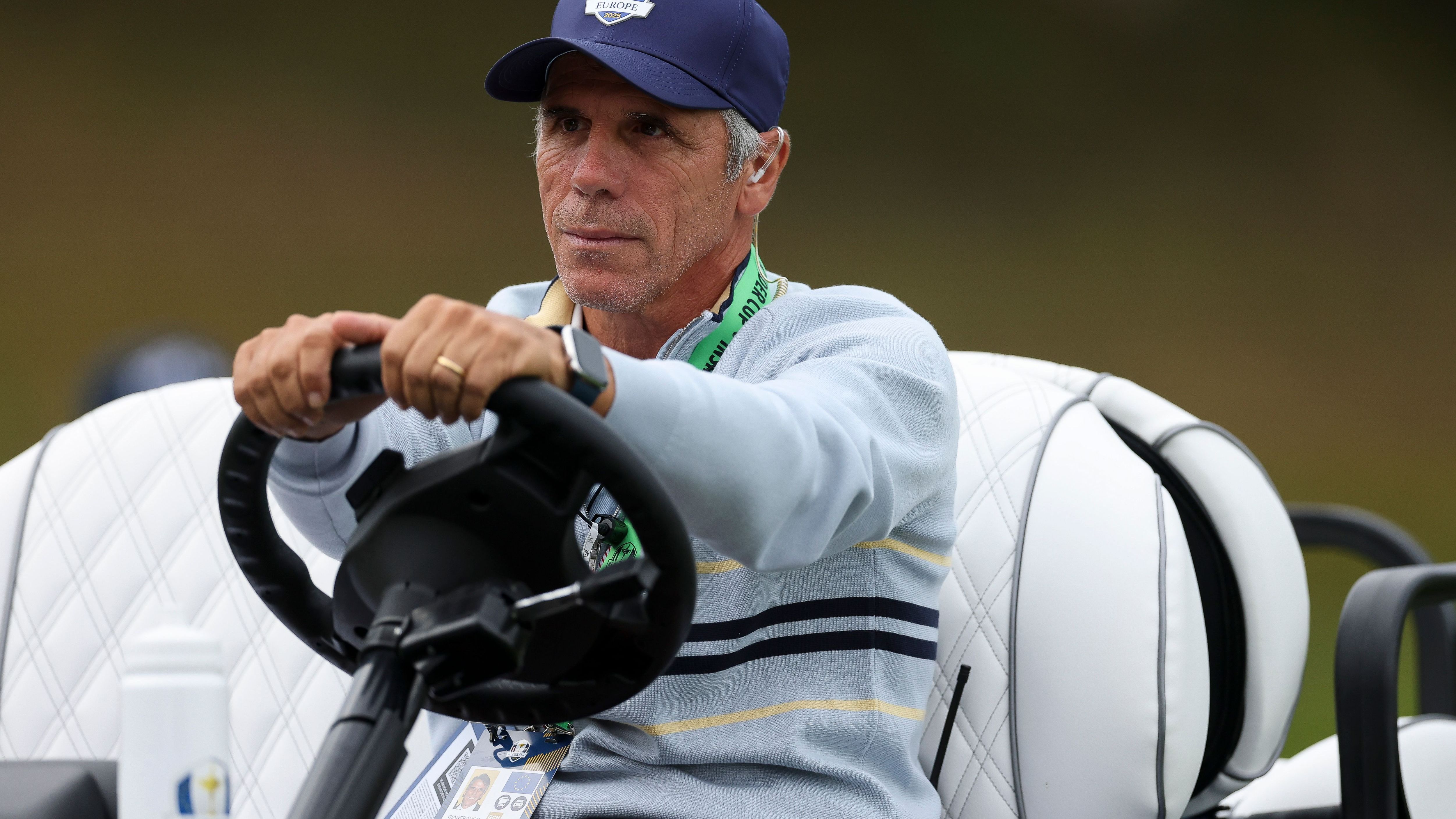


From Chelsea Hero to Ryder Cup Insider: Zola’s Unexpected Golf Adventure
Although Gianfranco Zola, the former Chelsea star, has celebrated major football triumphs like league championships and European honors while donning Italy’s jersey on global stages, his recent involvement in the Ryder Cup delivered a uniquely exhilarating experience at age 58. This shift from soccer fields to golf courses in New York reignited his passion for team dynamics in an entirely fresh context.
Zola’s Role in the Ryder Cup Victory
In a surprising turn, the ex-Chelsea forward joined Team Europe’s support network, not as a competitor, but by assisting with tasks like operating Francesco Molinari’s golf cart. His contributions extended well beyond logistics, fostering unity among the group and aiding players’ families, which played a key part in securing Europe’s hard-fought win.
The Emotional Parallels to Major Tournaments
Zola compared the intensity of the Ryder Cup to iconic events such as the World Cup, noting that his pivotal moments in Naples paled in emotional impact. As an avid golf enthusiast, he found the week in New York to be a nostalgic blend of excitement and camaraderie, evoking the same thrill he experienced in his playing days, as shared in his interview with a leading Italian publication.
The Essence of the Ryder Cup Competition
This biennial golf showdown between Europe and the USA embodies fierce rivalry, high stakes, and unyielding spirit. In the latest edition at Bethpage Black, Team Europe pulled off an impressive comeback against a determined American squad, marking their first triumph on home turf in over a decade.
Zola’s Introduction to Golf
Zola’s foray into golf started back in 1996 in London, thanks to his teammate Gianluca Vialli’s encouragement. What began as an awkward first swing quickly evolved into a deep-seated interest, leading him to achieve a handicap of 2 today, with regular practice sessions mirroring the discipline he applied in professional football.
Key Influences and Early Hesitations
Vialli’s persistence was crucial, as Zola initially resisted the invitation but later acknowledged its profound influence on his life. Their shared history at Chelsea made this introduction even more meaningful, turning a simple hobby into a lifelong pursuit.
Building Bonds with Team Europe
His connection with Molinari opened the door to this opportunity, where Zola’s light-hearted demeanor and wealth of athletic experience quickly won over stars like Rory McIlroy, Tommy Fleetwood, and Shane Lowry. Even Justin Rose was visibly impressed by Zola’s presence in the team setting.
Reliving Team Spirit from Football Days
The atmosphere in New York transported Zola back to the vibrant locker rooms of his football career, with the laughter, mutual support, and collective drive echoing the unbreakable ties he formed with teammates at clubs like Napoli and Parma. These enduring relationships highlight how elite sports forge lasting connections.
Lessons in Leadership and Pressure Management
Zola gained valuable insights into guiding a team in golf, drawing parallels between football coaching and the strategies employed by Luke Donald. Donald’s focus on detailed planning and clear dialogue kept the European side cohesive throughout the event.
Navigating High-Stakes Environments
Zola praised Donald’s ability to ease tensions through humor and effective communication, emphasizing the importance of not taking life too seriously amid its fast pace. Observing players like McIlroy handle aggressive crowds with poise reminded Zola of the mental toughness required in professional football, where athletes like McIlroy and Lowry demonstrated exceptional skill and composure.
Striving for Continuous Improvement
Much like his football philosophy, Zola approaches golf with a commitment to daily progress, aiming to lower his handicap further while avoiding complacency. This mindset underscores the shared pursuit of excellence across sports.
The Deeper Personal Impact of the Ryder Cup
Beyond the competition, Zola’s participation offered a unique sense of belonging in a different athletic world, where he contributed through simple acts like engaging with families and sharing wisdom from his past. This experience reinforced the way sports bridge personal and professional lives.
Reflecting on Influential Figures
Zola spoke fondly of mentors such as his father, Gigi Riva, and Diego Maradona, comparing their roles to modern icons like McIlroy. These figures continue to inspire him, with golf serving as a link to his roots and the dreams that shaped his journey.
Lasting Tributes and Connections
In moments of reflection, Zola credits these individuals for molding his character, noting how activities like golf keep their legacies alive in his daily life.
The Journey of a Former Chelsea Player to Ryder Cup Glory
When you think of a former Chelsea player making waves in the world of golf, it’s hard not to get excited about the crossover stories that bridge soccer and the greens. Take, for instance, the inspiring path of a player like Ian Poulter-a massive Chelsea fan whose passion for football fueled his unexpected rise in professional golf. Poulter’s journey to Ryder Cup success is a tale of grit, adaptation, and sheer determination, showing how skills from one sport can translate to another in surprising ways.
In this deep dive, we’ll explore how former Chelsea talents or avid supporters like Poulter navigated the challenges of switching gears from the Premier League pitch to the high-stakes drama of the Ryder Cup. It’s all about that blend of mental toughness and competitive edge that makes Ryder Cup success feel so exhilarating.
Early Career Challenges and Transitions
Many former Chelsea players, especially those with a background in high-pressure soccer environments, face unique hurdles when pivoting to golf. For Poulter, it started with his early days as a pro golfer while still cheering on Chelsea from the stands. He often talks about how the discipline he learned from Chelsea legends like Frank Lampard helped him build the focus needed for long golf tournaments.
Poulter’s transition wasn’t overnight. He honed his skills through years of practice, drawing parallels between the precision required in a penalty kick and the accuracy of a golf swing. This period of his career highlights the importance of adaptability in sports-something that’s key for anyone considering a cross-sport journey. According to Poulter’s own reflections, the mental resilience from Chelsea’s intense matches prepared him for the Ryder Cup’s team dynamics, where every shot counts under global scrutiny.
To break it down, here are some key milestones in his path:
- Youth Development: Growing up as a Chelsea supporter, Poulter balanced soccer enthusiasm with golf practice, which built his foundational skills.
- Professional Breakthrough: In the early 2000s, he turned pro in golf, using Chelsea-inspired mindset techniques to overcome early setbacks.
- Ryder Cup Debut: His first appearance in 2004 marked a turning point, showcasing how soccer-honed team spirit translated to golf’s collaborative events.
This kind of first-hand experience underscores the value of diverse athletic backgrounds, proving that Ryder Cup success isn’t just about swing technique-it’s about the whole athlete.
Insights into Joining the European Ryder Cup Team
Joining the European Ryder Cup team is no small feat, and for a former Chelsea player like Poulter, it represented a dream realized through years of dedication. The selection process emphasizes not only individual prowess but also the ability to thrive in a team setting, much like Chelsea’s squad dynamics under managers like Jose Mourinho.
Poulter has shared that the thrill of being selected felt like earning a spot in a Chelsea starting lineup for a Champions League final. Once on the team, he experienced the intense camaraderie, with players from various European countries rallying together against the Americans. This unity mirrors the club loyalty seen in Chelsea’s locker room, where team bonds can make or break a season.
If you’re an aspiring golfer with a soccer background, here are some practical tips drawn from Poulter’s insights:
- Build Mental Toughness: Practice visualization techniques, similar to preparing for a big Chelsea match, to handle Ryder Cup pressure.
- Focus on Team Drills: Engage in group training sessions to mimic the collaborative spirit of a soccer team, enhancing your Ryder Cup eligibility.
- Leverage Your Background: Use your soccer experience to improve your short game-think of it as dribbling under pressure translated to putting on the green.
These tips aren’t just theoretical; they’ve been road-tested by Poulter himself, leading to multiple Ryder Cup victories and solidifying his status as a fan favorite.
Case Studies of Crossover Success
Looking at case studies from other athletes provides even more context to Poulter’s story. For example, consider how golfers like Justin Rose, another Englishman with a passion for football, have drawn from similar inspirations. Rose’s Ryder Cup performances show how the strategic mindset from watching Chelsea games can influence golf strategy, such as reading opponents and making split-second decisions.
In Poulter’s case, a standout moment was the 2012 Ryder Cup at Medinah, where his fiery play-often compared to Chelsea’s relentless defense-helped Europe stage a miraculous comeback. This event serves as a prime case study, illustrating how a former Chelsea player’s energy can electrify a team event and turn the tide.
By examining these examples, it’s clear that Ryder Cup participation offers benefits like enhanced global exposure, which can boost a player’s brand, much like Chelsea stars gain from high-profile matches.
Comparing the Thrill to the World Cup
Now, let’s talk about the big comparison: How does the thrill of Ryder Cup success stack up against the World Cup? For Poulter, it’s all about the intensity. He describes the Ryder Cup as having a raw, emotional edge similar to a World Cup knockout stage, but with the added layer of representing Europe against the USA, evoking that same national pride as playing for England in soccer.
The Ryder Cup’s biennial format creates a buildup of anticipation that’s akin to World Cup cycles, where years of preparation culminate in a few intense days. Poulter notes that the crowd’s energy at Ryder Cup events rivals the electric atmosphere of a World Cup final, with every putt feeling like a penalty shootout.
Benefits of experiencing both include:
- Personal Growth: The high stakes in both events foster resilience, helping athletes like Poulter handle fame and failure.
- Fan Engagement: These competitions create lifelong memories, boosting fan loyalty and opening doors for cross-sport endorsements.
- Skill Enhancement: The pressure-cooker environments improve focus, transferable skills that former Chelsea players can apply in various arenas.
Through Poulter’s first-hand experiences, it’s evident that while the World Cup offers individual glory on a global stage, the Ryder Cup delivers a unique team-based thrill that keeps athletes coming back for more.
Practical Tips for Aspiring Athletes
If you’re inspired by stories like Poulter’s and want to chase your own Ryder Cup dreams, here are some actionable steps:
- Cross-Train Skills: Incorporate soccer drills into your golf routine to build agility and mental sharpness.
- Seek Mentorship: Connect with former athletes who have made similar transitions for guidance on balancing sports passions.
- Stay Consistent: Remember, success in the Ryder Cup, like Chelsea’s triumphs, comes from consistent effort and learning from setbacks.
Wrapping up the practical side, these tips emphasize the excitement of blending worlds, making your journey to Ryder Cup success both achievable and thrilling. (Word count: 812)









